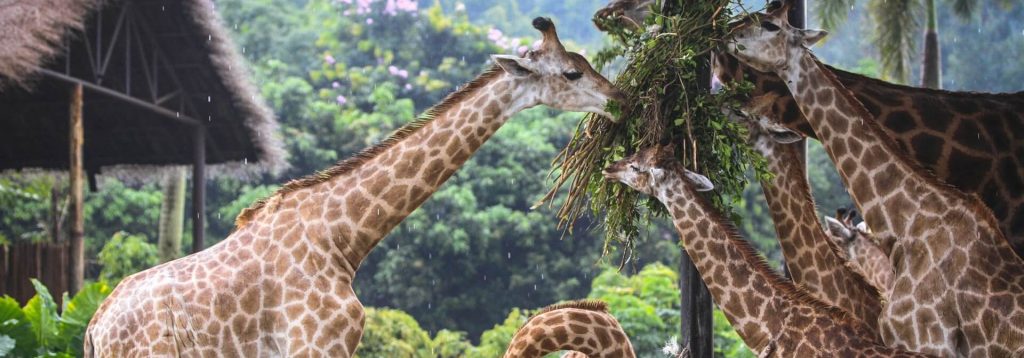Student-centric advice and objective recommendations
Higher education has never been more confusing or expensive. Our goal is to help you navigate the very big decisions related to higher ed with objective information and expert advice. Each piece of content on the site is original, based on extensive research, and reviewed by multiple editors, including a subject matter expert. This ensures that all of our content is up-to-date, useful, accurate, and thorough.
Our reviews and recommendations are based on extensive research, testing, and feedback. We may receive commission from links on our website, but that doesn’t affect our editors’ opinions. Our marketing partners don’t review, approve or endorse our editorial content. It’s accurate to the best of our knowledge when posted. You can find a complete list of our partners here.
How to Become a Zoologist
 By
Cece Gilmore
By
Cece Gilmore 
Cece Gilmore is a Content Writer at Scholarships360. Cece earned her undergraduate degree in Journalism and Mass Communications from Arizona State University. While at ASU, she was the education editor as well as a published staff reporter at Downtown Devil. Cece was also the co-host of her own radio show on Blaze Radio ASU.
Full BioLearn about our editorial policies

Do you love animals? Do you find animals fascinating? Is biology your favorite subject? If you answered yes to all of these questions, a career in zoology may be perfect for you.
Zoologists are biologists who study various animal species. This includes both animals in the wild and in captivity. A zoologist’s goal is to understand how animals interact with their environment.
Related: Top careers for the future
What does a zoologist do?
Zoology has a wide field of applications. Depending on where a zoologist works, they will have a lot of different responsibilities.
These include, but are not limited to:
| Observe animals | Analyze Data |
| Speak publicly | Network with other scientists |
| Track animal life cycles | Track migration patterns |
| Write reports | Monitor an animal’s diet |
In this guide, we’ll go over everything you need to know about how to become a zoologist. Let’s get into it:
1. Earn a college degree
To become a zoologist you most likely will need a bachelor’s degree, master’s degree, or even a Ph.D.
Recommended undergraduate degree programs include bachelor’s of science in the following fields:
- Animal Science
- Wildlife Conservation
- Biology
- Zoology
- Ecology
A bachelor’s degree is necessary for an entry level zoologist position, while a master’s degree or Ph.D are recommended for advanced research or teaching occupations.
Don’t miss: How to choose a major
An entry-level zoologist position would look like:
- Caring for animals
- Assisting in a location’s general needs
An advanced zoologist position would look like:
- A professor at a university
- Research technician or scientist
Also see: What is the average starting salary out of college?
2. Gain experience
Gain hands-on experience through internships, volunteer work or a science related job while receiving your undergraduate degree.
You can obtain these opportunities by reaching out to zoos and local organizations such as an animal sanctuary to see if they are hiring. A typical zoologist internship would look like working alongside a zookeeper or zoologist as they tend for the animals. This will provide you hands-on experience in an animal sanctuary or zoo.
However, you can also gain valuable experience from participating in experiences that are not immediately relevant to the profession of being a zoologist. An example would be a tour guide at a local zoo. This will demonstrate interest in the field and enable you to make connections at the zoo to further your connections.
This will make your resume stand out. It will also give you a taste of what your future career in zoology will look like.
3. Build your skills
Becoming a zoologist can be a physically and emotionally demanding occupation. To make sure there is success in this position – build up your skills!
Skills zoologists will need:
- Communication skills – Zoologists may need to write papers and give speeches
- Critical thinking skills – Zoologists may need to draw conclusions from scientific observations
- Outdoor skills – Zoologists may need certain outdoor skills such as chopping firewood, navigating rough terrain, or performing other activities in remote areas
- Problem solving skills – Zoologists should be able to find solutions to any threats affecting the animals they are studying
- Emotional stamina – Emotional stability is necessary for being a zoologist as animals may become sick or injured
- Observation skills – Zoologists will need to notice changes in the animals they are studying
- Comfort with technology – Zoologists may need to work with new technologies and scientific equipment
Related: Top biology scholarships
4. Choose a location to work
As a zoologist, there are a variety of opportunities as to where you can work.
Locations where zoologists can work include:
- Zoos
- Parks
- Wildlife Centers
- National Parks
- Aquariums
- Non-profit organizations
- Rehabilitation groups
- Museums
- Offices
- Universities
- Laboratories
- Pharmaceutical companies
These locations all have slightly different responsibilities for a zoologist to complete. For example, a zoo may need a zoologist to care for the animals while a laboratory may need a zoologist to test new animal drugs.
Frequently asked questions about how to become a zoologist
How much money does a zoologist make?


